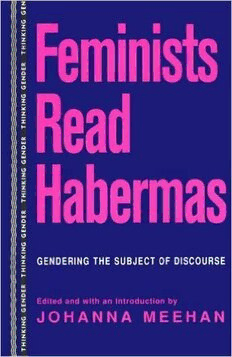
Feminists Read Habermas: Gendering the Subject of Discourse PDF
Preview Feminists Read Habermas: Gendering the Subject of Discourse
Thinking Gender Edited by Linda Nicholson Also published in the series Feminism/Postmodernism Linda Nicholson Gender Trouble Judith Butler Words of Power Andrea Nye Femininity and Domination Sandra Bartky Disciplining Foucault Jana Sawicki Beyond Accommodation Drucilla Cornell Embattled Eros Steven Seidman Erotic Welfare Linda Singer Materialist Feminism and the Politics of Discourse Rosemary Hennessy An Ethic of Care Mary Jeanne Larrabee Feminist Epistemologies Linda Alcoff and Elizabeth Potter Gender Politics and Post-Communism Nanette Funk and Magda Mueller Engenderings Naomi Scheman Feminist Theory and the Classics Nancy Rabinowitz and Amy Richlin Postmodern Revisionings of the Political Anna Yeatman Moral Dilemmas of Feminism Laurie Shrage Subjection and Subjectivity Diana Tietjens Meyers Feminist Contentions Seyla Benhabib, Judith Butler, Drucilla Cornell, and Nancy Fraser Feminists Read Habermas: Gendering the Subject of Discourse Edited and with an introduction by Johanna Meehan ROUTLEDGE New York and London Published in 1995 by Routledge 29 West 35TH Street New York, NY 10001 Published in Great Britain in 1995 by Routledge 11 New Fetter Lane London EC4P4EE Copyright © 1995 by Routledge Printed in the United States of America All rights reserved. No part of this book may be reprinted or reproduced or utilized in any form or by any electronic, mechanical, or other means, now known or hereafter invented, including photocopying and recording, or in any information storage or retrieval system without permission in writing from the publishers. Library of Congress Cataloging-in-Publications Data Feminists Read Habermas: gendering the subject of discourse / edited and with an introduction by Johanna Meehan. p. cm. — (Thinking gender) Includes bibliographical references and index. ISBN 0-415-90713-6 ISBN 0-415-90714-4 (pbk.) 1. Feminist theory. 2. Critical theory. 3. Habermas, Jurgen. I. Meehan, Johanna. II. Series HQ1190.F464 1995 305.42’01—dc20 94-20585 CIP This book is dedicated to my mother, Ring Kelleher, the origin of all my aspirations and the model of so many. Contents Acknowledgments ix A Note on the Text xi Introduction 1 1. What’s Critical about Critical Theory? 21 Nancy Fraser 2. Critical Social Theory and Feminist Critiques: 57 The Debate with Jurgen Habermas Jean L. Cohen 3. The Public and the Private Sphere: 91 A Feminist Reconsideration Joan B. Landes 4. Women and the “Public Use of Reason” 117 Marie Fleming 5. From Communicative Rationality 139 to Communicative Thinking: A Basis for Feminist Theory and Practice Jane Braaten viii / Contents 6. Feminist Discourse/Practical Discourse 163 Simone Chambers 7. The Debate over Women and Moral Theory Revisited 181 Seyla Benhabib 8. Discourse in Different Voices 205 Jodi Dean 9. Autonomy, Recognition, and Respect: 231 Habermas, Benjamin, and Honneth Johanna Meehan 10. Discourse Ethics and Feminist Dilemmas of Difference 247 Georgia Warnke 11. Toward a Model of Self-Identity: 263 Habermas and Kristeva Allison Weir Index 283 Contributors 289 Acknowledgments Over the years I have accumulated many intellectual debts, some general and some specific to this project. To Thomas McCarthy, my mentor and friend, I am especially indebted. As a mentor he offered lessons in intellectual and personal integrity, and as a friend he lent them a special humor and grace. I am deeply grateful. Seyla Benhabib endorsed this project and has been an exciting and impor tant influence. I thank her. In the last few years Alan Schrift and Ciaran Cronin have afforded me an intellectual camaraderie I treasure, as I do that of my sisters which extends back to our childhoods together. Assembling and editing this collection demanded a lot more work than seems explicable; and without the help of the following people the volume would not have been produced. Editor Maureen MacGrogan believed that this anthology was a good idea and was forgiving of my tardiness. She was infallibly kind, as was editorial assistant Alison Shonkwiler. I appreciate their trust in me and this project. Gayle Salamon (student, friend, and research-assistant extraordinare) must be thanked for transforming hard work into an occasion for camaraderie and laughter. Lisa Mulholland offered support and encouragement from the inception to the printing of this project and with Jeanette Copeman lent impressive professional competence to the edit ing, wordprocessing, and delivery of this manuscript. I am thankful for their skills and for their kindness and affection. And to Maura Strassberg, my staunchest ally and most critical critic, to whom I owe everything, my thanks, while woefully inadequate, are heartily offered. A Note on the Text I would like to express appreciation for permission to reprint the following: Seyla Benhabib, “Women and Moral Theory, Revisited, ” Situating the Self: Gender, Community and Postmodernism in Contemporary Ethics (Polity Press, Oxford, 1992). Jean Cohen, “The Historicist Critique, ” Civil Society and Political Theory, eds. Jean Cohen and Andrew Arato (MIT Press, 1992), pp. 201-254. Marie Fleming, “Women and the ‘Public Use of Reason, ’” Social Theory and Practice, Vol. 19, No. 1 (Spring 1993), pp. 27-50. Nancy Fraser, “What’s So Critical About Critical Theory? The Case of Habermas and Gender, ” Unruly Practices: Power, Discourse, and Gender in Contemporary Social Theory (Minneapolis: University of Minnesota Press, 1989). Joan Landes, “The Public and Private Sphere: A Feminist Reconsideration, ” new title, appeared in an earlier version as “Rethinking Habermas’s Public Sphere, ” Political Theory Newsletter, 4: 1 (April 1992), pp. 51-69. An earlier version of this essay, “Jurgen Habermas’s ‘The Structural Transformation of the Public Sphere, ”’ appeared in Praxis International, 12: 1 (1992), pp. 106-127.
